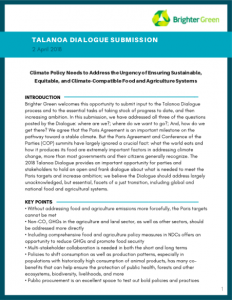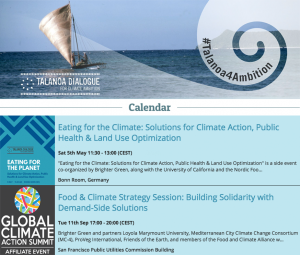
Talanoa Dialogue

An outcome of COP23 hosted by Fiji in Bonn, Germany in 2017, the Talanoa Dialogue takes stock of the collective efforts of countries in relation to progress towards the Paris Agreement goals and to inform the preparation of nationally determined contributions (NDCs). Its a process meant to elevate the voices of those most effected by climate change and usually with the least representation within the UNFCCC negotiations, including communities, minorities, women, youth, Indigenous Peoples, and representatives of small island states and low-income countries.
Brighter Green has participated in the process throughout the year, including several writing contributions: a submission in the spring prior to the intercessional meeting in Bonn; two in the fall answering questions 2 and 3; and a comprehensive submission (PDF) to share at COP24 in Katowice, Poland (this version has an accompanying postcard and two-page briefing). We’ve also organized meetings and events during climate conferences under the Talanoa Dialogue umbrella to amplify food systems issues that have not yet been included in the formal negotiation process. These include a side event during the Bonn intercessional in May 2018 (details here) and an affiliate event during the Global Climate Action Summit in San Francisco in September 2018 (details here). Both were official events in the Talanoa Dialogue calendar.
The submissions process throughout the year has allowed us to identify the growing number of civil society organizations that are also calling for shifting diets away from animal-based foods as essential to countering climate change. Such examples are summarized in the overview of inputs from the spring submissions (PDF). The relevant organizations and links are compiled on this page.
In the synthesis report of the preparatory phase (PDF) released in November 2018, shifting diets once again appeared in the text explicitly. One of the key points from the second question, ‘Where do we want to go?’ is:
We have made significant changes to our diets through reduced consumption of meat and dairy products.
With the shift so clearly spelled out by these official summaries, as well as the findings of the recent United Nations Intergovernmental Panel on Climate Change (IPCC) 1.5C Special Report released in October 2018 and more scientific studies, countries are bound to see the reason in acting on diets and the food system, within and outside of the UNFCCC. For a list of other Talanoa Dialogue submissions calling for the same action, click here.
 Brighter Green
Brighter Green





